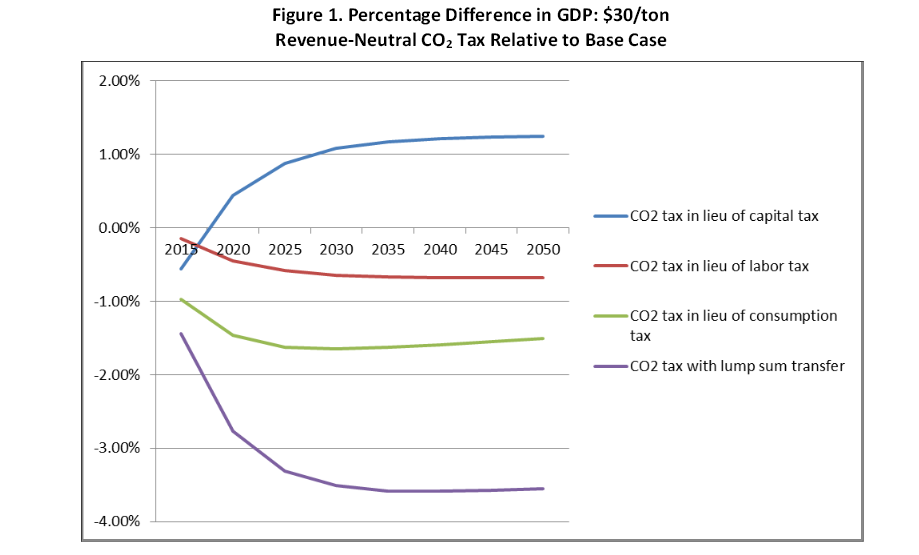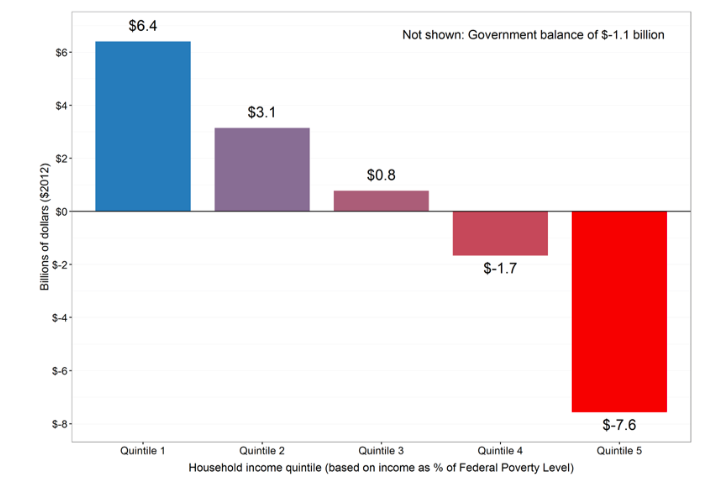The distribution of carbon tax burdens creates an opportunity for “progressive tax-shifting,” in which a portion of carbon tax revenue is dedicated to reducing regressive taxes such as the payroll tax (at the federal level) or sales taxes (at the state level). An early proponent of such a carbon tax shift was Al Gore, with his exhortation to “Tax what we burn, not what we earn.” Shifting taxes away from payroll and/or sales taxes and onto carbon pollution could raise, not lower, the after-tax incomes of a majority of below-median-income households, giving this approach a net progressive effect.
In addition to this potential progressive effect of tax shifting, a wide range of economists, [including Lawrence Goulder, Roberton Williams & Ian Parry, Gilbert Metcalf & David Weisbach, Alan Viard, Robert Shapiro, Donald Marron & Eric Toder] have concluded that use of revenue to reduce other taxes would improve the overall efficiency of the economy, for example, by removing burdens on work.
In October 2007, the Brookings Institution published a A Proposal for a U.S. Carbon Tax Swap — An Equitable Tax Reform to Address Global Climate Change by Tufts University economics professor Gilbert E. Metcalf, describing a national carbon tax paired with an income tax credit for payroll taxes paid. Metcalf assessed the impact of a tax of $15 per metric ton of carbon dioxide and five major greenhouse gases. Revenues would be used to credit payroll tax paid on the first $3,660 of earnings per worker. Metcalf showed that such a tax swap would be both revenue-neutral and distributionally-neutral. (Harvard professor and former Bush Administration economist Gregory Mankiw mentioned the Metcalf paper in a Sept. 2007 New York Times op-ed, discussed on our blog.) Rep. John Larson (D-CT) adopted Metcalf’s framework for his “America’s Energy Security Trust Fund Act,” discussed on our Bills page.
 More recent analysis has confirmed the importance of carbon tax revenue wisely; using it to reduce other “distortionary” taxes can offer large enough efficiency benefits to reduce or even possibly eliminate the economic drag that a carbon tax would otherwise create. In Deficit Reduction and Carbon Taxes: Budgetary, Economic, and Distributional Impacts (2013) researchers from Resources for the Future found that using carbon tax revenue to reduce corporate income tax rates offers large enough efficiency benefits to more than overcome the efficiency loss of a carbon tax. The next best option is using revenue to cut wage taxes, while using revenue to cutting other consumption taxes is somewhat less efficient. Finally, refunding carbon tax revenue in a “lump sum rebate” (dividend) offers the least economic efficiency benefit.
More recent analysis has confirmed the importance of carbon tax revenue wisely; using it to reduce other “distortionary” taxes can offer large enough efficiency benefits to reduce or even possibly eliminate the economic drag that a carbon tax would otherwise create. In Deficit Reduction and Carbon Taxes: Budgetary, Economic, and Distributional Impacts (2013) researchers from Resources for the Future found that using carbon tax revenue to reduce corporate income tax rates offers large enough efficiency benefits to more than overcome the efficiency loss of a carbon tax. The next best option is using revenue to cut wage taxes, while using revenue to cutting other consumption taxes is somewhat less efficient. Finally, refunding carbon tax revenue in a “lump sum rebate” (dividend) offers the least economic efficiency benefit.
Reducing the top marginal corporate income tax rate has been articulated as a goal by leaders of both major political parties. In an effort to attract Republican interest, Rep. John Delaney (D-MD) has introduced a carbon tax measure that would devote half its revenue to corporate income tax reduction.
Nevertheless, the growing economics literature on carbon taxes suggests a strong a tradeoff between the efficiency benefits of using carbon tax revenue to cut taxes on capital (as the Delaney proposal would do) and the distributional benefits of cutting taxes on labor (as Rep. Larson’s proposal would).
Related CTC blog posts and articles:
- British Columbia’s Carbon Tax Architects Speak (2015).
- The Carbon Tax Revenue Menu, outlining the benefits of various revenue options (2011).
- Carbon Tax Offers Super Powers to Super-Committee, discussing potential for a carbon tax to reduce the deficit (2011).
- Midterm Advice for Congress: Tax Carbon Instead of Jobs (Robert Shapiro, Huffington Post, 2010).
- Capitol Hill Briefing on Carbon Taxes Draws Overflow Crowd, Rep. John Larson (D-CT) led off CTC’s event, articulating the benefits of a taxing carbon pollution while cutting wage taxes (12/9/08).
Related journal articles and papers:
- Taxing Carbon and Recycling the Revenue: Who Wins and Loses? (Donald Marron, Eric Toder, and Lydia Austin, Urban-Brookings Tax Policy Center, Nov. 2015).
- Tax Policy Issues in Designing a Carbon Tax (Donald B. Marron and Eric J. Toder, Urban-Brookings Tax Policy Center, 2014).
- Getting to an Efficient Carbon Tax: How the Revenue is Used Matters (Jared Carbone, Richard D. Morgenstern, Roberton C. Williams III, and Dallas Burtraw, Resources for the Future, 2014).
- A Carbon Tax in Broader U.S. Fiscal Reform: Design and Distributional Issues, Adele Morris (Brookings) and Aparna Mathur (American Enterprise Institute), C2ES, 2014).
- Carbon Tax Revenue and the Budget Deficit: A Win-Win-Win Solution? (MIT, 2012).
- The Potential Role of a Carbon Tax in U.S. Fiscal Reform (Brookings, 2012).
- Fiscal Policy to Mitigate Climate Change (IMF, 2012).
- How Climate Policy Could Address Fiscal Shortfalls (Adele Morris & Ted Gayer, Brookings, 2010).
- Addressing Climate Change Without Impairing the US Economy (Robert Shapiro, U.S. Climate Task Force, 2009).
- A Proposal for a U.S. Carbon Tax Swap (Gilbert Metcalf, Brookings, 2007).

